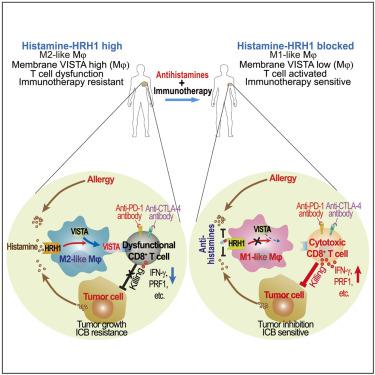Cancer Cell ( IF 50.3 ) Pub Date : 2021-11-24 , DOI: 10.1016/j.ccell.2021.11.002 Hongzhong Li 1 , Yi Xiao 1 , Qin Li 1 , Jun Yao 1 , Xiangliang Yuan 1 , Yuan Zhang 1 , Xuedong Yin 1 , Yohei Saito 1 , Huihui Fan 2 , Ping Li 1 , Wen-Ling Kuo 1 , Angela Halpin 3 , Don L Gibbons 4 , Hideo Yagita 5 , Zhongming Zhao 6 , Da Pang 7 , Guosheng Ren 8 , Cassian Yee 9 , J Jack Lee 10 , Dihua Yu 1

|
Reinvigoration of antitumor immunity remains an unmet challenge. Our retrospective analyses revealed that cancer patients who took antihistamines during immunotherapy treatment had significantly improved survival. We uncovered that histamine and histamine receptor H1 (HRH1) are frequently increased in the tumor microenvironment and induce T cell dysfunction. Mechanistically, HRH1-activated macrophages polarize toward an M2-like immunosuppressive phenotype with increased expression of the immune checkpoint VISTA, rendering T cells dysfunctional. HRH1 knockout or antihistamine treatment reverted macrophage immunosuppression, revitalized T cell cytotoxic function, and restored immunotherapy response. Allergy, via the histamine-HRH1 axis, facilitated tumor growth and induced immunotherapy resistance in mice and humans. Importantly, cancer patients with low plasma histamine levels had a more than tripled objective response rate to anti-PD-1 treatment compared with patients with high plasma histamine. Altogether, pre-existing allergy or high histamine levels in cancer patients can dampen immunotherapy responses and warrant prospectively exploring antihistamines as adjuvant agents for combinatorial immunotherapy.
中文翻译:

过敏介质组胺通过激活巨噬细胞组胺受体 H1 赋予癌症患者免疫治疗抗性
重振抗肿瘤免疫力仍然是一个未解决的挑战。我们的回顾性分析显示,在免疫治疗期间服用抗组胺药的癌症患者的生存率显着提高。我们发现组胺和组胺受体 H1 (HRH1) 在肿瘤微环境中经常增加并诱导 T 细胞功能障碍。从机制上讲,HRH1 激活的巨噬细胞极化为 M2 样免疫抑制表型,免疫检查点 VISTA 的表达增加,导致 T 细胞功能失调。HRH1 敲除或抗组胺药治疗恢复了巨噬细胞的免疫抑制,恢复了 T 细胞的细胞毒性功能,并恢复了免疫治疗反应。过敏通过组胺-HRH1 轴促进小鼠和人类的肿瘤生长并诱导免疫治疗耐药性。重要的,与血浆组胺水平高的患者相比,血浆组胺水平低的癌症患者对抗 PD-1 治疗的客观反应率高出三倍多。总而言之,癌症患者中预先存在的过敏或高组胺水平会抑制免疫治疗反应,并有必要前瞻性地探索抗组胺药作为联合免疫治疗的辅助药物。


























 京公网安备 11010802027423号
京公网安备 11010802027423号